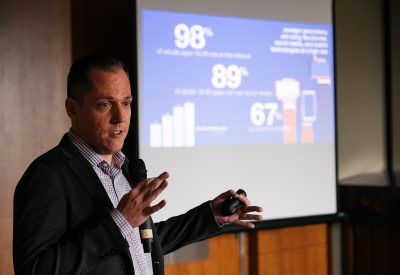
The Digital Learning Initiative hosted a presentation, “Who is your Social Media Self? College Student Motivation and Vulnerability Online” Tuesday afternoon to explore the learning and developmental experiences of college students, particularly as they engage in online social environments.
Approximately 25 people, primarily faculty and alumni, listened to author Paul Gordon Brown in the Florence and Chafetz Hillel House. This was the final portion of the DLI’s Fall 2016 Speaker Series.
DLI Director Romy Ruukel introduced Brown at the beginning of the presentation. Brown then discussed his own education background and how he has spent his life working at universities, both in residence life and academic advising.
“When I want back for my Ph.D. and I was working on my dissertation, I was trying to decide what I wanted to study,” Brown said. “I decided I wanted to wed my love of technology with my love of college students.”
Brown then showed the audience two videos: one depicting the negative aspects associated with social media and the other demonstrating the positives. After each video, Brown opened up the conversation to the audience.
The first was a slam poetry video made by Prince Ea, titled “Anti-Social Network (A Poetry Video).” Throughout the video, Ea uses statistics to demonstrate the potential dangers of social media.
The second video, “Social Media and Ambient Intimacy” showed social media in a more positive light.
“There’s nothing inauthentic about this interpersonal exchange that’s occurring all the time. It’s just another space for communication. It’s not better or worse,” said Jason Silva, the narrator of the second video.
Brown then discussed his recently finished book, “What Happens on Campus Stays on YouTube,” in which he analyzes the effects of social media on college students. In the book, Brown said, he tried to answer one question: “How do I navigate the online space and know that colleges and employers are going to be looking at this?”
As a part of his book research, Brown observed 16 college upperclassmen and asked them about their social media personalities.
Brown said many students’ first lesson on social media is in high school, but the message in high school is usually “be very careful, be afraid, bad things happen online, stay away.”
Brown said he interviewed mostly upperclassmen because as they moved through college, they became less concerned with being popular.
“The way we use social media changes,” Brown said. “It evolves with us.”
Brown then showed another video, “What’s on your mind?” to explain how we selectively present our lives to others via social media.
After the presentation, several BU faculty members said they attended to learn more about how social media has affected people.
Vika Zafrin, a digital scholarship librarian, said she has been on social media since the mid ‘90s, and she is very interested in social media.
“This topic interests me, how we behave online interests me and how college students behave online interests me to the extent that they are part of my client basis as a librarian,” Zafrin said.
Anna Newman, another librarian, said she was surprised by how the discussion barely touched upon privacy issues.
“I’m just interested in general thinking about this idea of identity on social media,” Newman said. “Thinking about ideas of privacy, I was surprised that didn’t come up more in conversation.”
Eileen Daily, director of the Doctor of Ministry in Transformational Leadership program in STH, said she noted the importance of utilizing social media in her own field.
“I run a distance education program about transformation and leadership for ministers,” Daily said. “It’s very difficult to be a transformational leader in the ministry today without staking a claim in the social media space.”





I think this was a very well article written. Love it. Defintely reading more from now on.